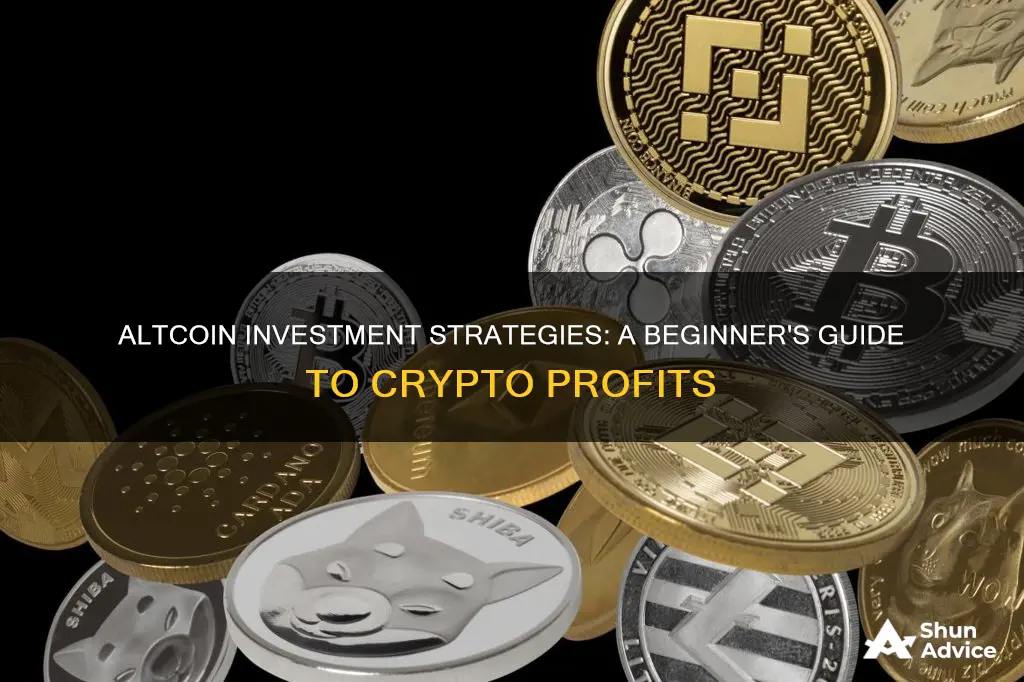
Investing in cryptocurrencies is a risky business. While some have made millions, others would call it degenerate gambling. If you're new to the world of cryptocurrencies, the first thing you need to know is that it's unregulated. There is no centralised statutory regulation, and it's monitored by no centralised banking system. The second thing to know is that it's volatile. Fortunes are built and demolished in seconds.
If you're still interested in investing in altcoins, there are a few strategies you can employ. Firstly, you could invest in an altcoin while it's still in its ICO (Initial Coin Offering) phase. This will guarantee the cheapest possible coin. Secondly, you could hold out for a coin to hit the market and avoid the ICO mania. Look for a coin that hits its first dip on the market and take aim at buying; this can even lead to a cheaper buy than the ICO sale price. Thirdly, you could try a more complicated and intensive strategy, keeping an eye on candle patterns and the volume, and continuously comparing the market cap to other similar coins to see if it is over or undervalued.
Remember, never invest more than you can afford to lose.
What You'll Learn

Buy during the ICO phase
Buying During the ICO Phase
An initial coin offering (ICO) is the cryptocurrency industry's equivalent of an initial public offering (IPO). A company seeking to raise money to create a new blockchain app or service with a cryptocurrency can launch an ICO as a way to crowdfund. Interested investors can buy into an ICO to receive a new cryptocurrency issued by the company.
ICOs can be structured in a few different ways:
- Static supply and static price: A company can set a specific funding goal or limit, meaning each token sold in the ICO has a preset price, and the total token supply is fixed.
- Static supply and dynamic price: An ICO can have a static supply of tokens and a dynamic funding goal—the amount of money received determines the overall price per token.
- Dynamic supply and static price: Some ICOs have a dynamic token supply but a static price, meaning the amount of funding received determines the supply.
If you're set on buying into a new ICO, it's important to do your homework. Ensure the people putting up the ICO are real and accountable, and investigate their history with crypto and blockchain.
- Make sure that project developers can clearly define their goals. Successful ICOs typically have straightforward, understandable white papers with clear, concise goals.
- Look for transparency. Investors should expect 100% transparency from a company launching an ICO.
- Review the ICO's terms and conditions. Because regulators and issuers are still figuring out how this process should work, you're responsible for ensuring that an ICO is legitimate.
- Ensure that ICO funds are stored in an escrow wallet. This type of wallet requires multiple access keys, providing useful protection against scams.
If you're venturing into the world of altcoin investing, the ICO phase is the best start. While ICOs are risky, they can offer the cheapest possible coin. As the coin hits the market, it can spike, and that's your cue to sell. In this way, you can easily profit between 100 and 300 percent. If there is no immediate spike, aim to get between 50 and 100 percent return before selling.
This strategy works well if you hedge your bets and buy into a few ICOs, rather than putting all your money into one ICO.
The Rise of Bitcoin: Why People are Investing
You may want to see also

Diversify your portfolio
Diversification is a key strategy when it comes to investing in altcoins. By spreading your investments across a range of different altcoins, you can reduce your risk and increase your potential for returns. Here are some tips to help you diversify your portfolio effectively:
- Don't put all your eggs in one basket: This is a common saying in the investment world, and it applies to altcoins as well. Investing in only one coin, even if it's Bitcoin, is not a wise strategy. Instead, aim to build a portfolio of different altcoins to spread your risk.
- Understand the risks of altcoins: Altcoins are generally considered riskier than Bitcoin due to their lack of established reputation, lower liquidity, and higher volatility. Make sure you carefully research and understand these risks before investing.
- Research and analysis: Before investing in any altcoin, do your due diligence by researching the project's whitepaper, team, community, and partnerships. Analyze the coin's historical price data, market capitalization, trading volume, and liquidity to assess its potential for growth and volatility.
- Diversify across different types of altcoins: Altcoins can be categorised in various ways, such as payment tokens, security tokens, gaming tokens, NFTs, and more. By investing in a range of different types of altcoins, you can further reduce your risk and increase your exposure to different areas of the market.
- Invest in a mix of established and newer coins: While newer altcoins may offer higher growth potential, they also come with higher risk. Consider investing in a mix of established coins like Bitcoin and Ethereum, as well as newer projects with high potential for growth.
- Pay attention to market trends: Keep yourself informed about the overall performance of different altcoins and the market as a whole. This can help you identify opportunities for growth and make more informed investment decisions.
- Consider dollar-cost averaging: This strategy involves investing a fixed amount of money in a particular altcoin at regular intervals, regardless of its price. Dollar-cost averaging can help you avoid the impact of market volatility and the fear of missing out on potential gains.
- Long-term holding: This strategy involves investing in a coin with strong fundamentals and growth potential and holding it for an extended period, usually years. Long-term holding requires patience and discipline, but it can potentially lead to high returns if the coin's growth potential is realised.
- Monitor and rebalance your portfolio: Diversification is an ongoing process. Regularly review your portfolio to ensure it remains aligned with your investment goals and risk tolerance. Make adjustments as needed to maintain a balanced approach and achieve your desired returns while managing risk.
Gold Coin Investment: Which Bullion is Worth Your Money?
You may want to see also

Assess the conditions of the asset
When investing in altcoins, it is important to conduct thorough research and assess the conditions of the asset. Here are some key considerations to keep in mind:
- Whitepaper and Value Proposition: Review the whitepaper of the altcoin project to understand its use cases, goals, and the team's vision. The whitepaper should clearly articulate how the altcoin will provide value to its users.
- Demand and Supply: Look for altcoins with increasing demand and stable or decreasing supply. This dynamic will drive up prices and fuel further demand.
- Team and Stakeholders: Evaluate the team and stakeholders behind the project. Assess their experience, credentials, and reputation in the crypto community. Ensure they have a track record of working on successful projects.
- Consensus Mechanism: Understand the consensus mechanism used by the altcoin, such as proof-of-work (PoW) or proof-of-stake (PoS). This mechanism is crucial for validating transactions and producing blocks.
- Unique Functionality: Identify the unique functionalities offered by the altcoin. Some altcoins focus on privacy, decentralised finance (DeFi), smart contracts, or energy efficiency.
- Regulatory and Legal Landscape: Consider the regulatory and legal landscape surrounding altcoins. Changes in regulations or crackdowns on cryptocurrency activities can impact the value and viability of your investment.
- Market Volatility: Altcoins are inherently volatile, and their prices can fluctuate significantly. Assess the market volatility and potential risks associated with the investment.
- Security: Evaluate the security measures implemented by the altcoin project. Understand the potential vulnerabilities and risks of hacking, scams, or technical issues.
- Use Cases: Look for altcoins with strong use cases and a clear purpose. Assess whether the altcoin addresses a specific need or solves a problem within the cryptocurrency ecosystem.
- Community and Adoption: Consider the community support and adoption rate of the altcoin. A strong and active community can indicate a healthy project with a dedicated user base.
- Competition and Differentiation: Analyse the competition within the altcoin space. Identify what sets this particular altcoin apart from others and whether it has a competitive advantage.
Remember to conduct a thorough analysis and assess all available information before making any investment decisions. Diversifying your portfolio across different altcoins can also help minimise risk.
A Beginner's Guide to Investing Bitcoin on Binance
You may want to see also

Avoid common scams
Investing in cryptocurrencies is a risky business, and the world of altcoins is especially volatile. As well as the usual risks associated with crypto, there are a number of common scams that you should be aware of before investing.
The Classic Pump and Dump
Popularised by films such as *Boiler Room* and *The Wolf of Wall Street*, this scam consistently snares investors with the promise of quick riches. An individual from a jurisdiction with lax securities laws hypes up a particular altcoin, creating a buying frenzy. Once the price reaches its peak, the con artist sells, leaving others out of pocket.
NFT Madness
Non-fungible tokens (NFTs) are one of the hottest segments of the crypto market, but they are also vulnerable to fraud. A common scam involves con artists minting or tokenizing artists' work without their permission.
Ponzi Schemes
A Ponzi scheme is "an investment scam that involves the payment of purported returns to existing investors from funds contributed by new investors". In the crypto context, this often takes the form of promising extremely high returns. For example, the disgraced Bitconnect promised 1% daily compounded interest.
DeFi Swindle
Decentralized finance (DeFi) is a popular application of blockchain technology, allowing anyone to be a market maker for a startup crypto exchange. However, DeFi protocols can also be abused for the purpose of pure swindling.
ICO is an IC-No
An initial coin offering (ICO) is a way for an upstart enterprise to seek capital in return for a stake in the business. While not inherently good or bad, ICOs are vulnerable to abuse and it is easy for anyone to promote one. Due diligence is essential before investing in an ICO.
How to Avoid Altcoin Scams
- Be wary of promises of exceptional profits.
- Be cautious if someone claims there is no risk involved.
- Be alert to wild passive income promises.
- Never give out your private keys or passwords.
- Investigate online altcoin exchanges thoroughly.
- Be sceptical of unsolicited communications.
- Verify contact information using official sources.
- Take your time before investing.
Gold Coin Investment: Royal Mint's Worth
You may want to see also

Choose the right wallet
Choosing the right wallet is an important step in investing in altcoins. Crypto wallets are available in two different forms: cold wallets and hot wallets.
Cold wallets, also known as hard wallets, are USB-like devices that store your private keys, making it difficult for hackers to access your funds without having physical access to the wallet. Examples of cold wallets include Trezor and Ledger. While cold wallets offer enhanced security, they may not be as convenient as hot wallets for users who frequently trade or access their funds.
Hot wallets, on the other hand, are connected and hosted online, either through a phone (e.g. Trust Wallet), desktop (e.g. Daedalus), or web app (e.g. MetaMask). They offer greater convenience and ease of access but are more vulnerable to security threats. It is important to carefully consider your priorities and preferences when choosing between a cold or hot wallet.
Additionally, when selecting a wallet, it is essential to consider the level of security it provides. Look for features such as PGP/GPG encryption for email communications, two-factor authentication (2FA), and global setting locks. Reputable exchanges like Coinbase, Binance, Kraken, or Crypto.com often provide additional security measures to protect your funds.
Another factor to consider is the compatibility of the wallet with different cryptocurrencies. Ensure that the wallet you choose supports the altcoins you plan to invest in. For example, the Gemini app supports Bitcoin and up to 25 altcoins.
Finally, consider the user interface and ease of use, especially if you are a beginner. Some wallets offer a sleek and intuitive mobile app, making it easier to monitor your assets and manage your wallet on the go. Others may provide a simple interface that is ideal for new investors who are hesitant about diving into crypto.
In summary, when choosing the right wallet for investing in altcoins, prioritise security, compatibility with your preferred altcoins, and a user-friendly interface. Remember to weigh the benefits of cold and hot wallets based on your investment strategy and frequency of trading.
KCS Coin: A Smart Investment Move?
You may want to see also
Frequently asked questions
Investing in cryptocurrencies is a risky business. Cryptocurrencies are not under any centralized statutory regulation and are basically regulated by the principle of cryptography. It is important to remember the golden rule of investment: never invest more than what you can afford to lose.
Here are some tips for investing in Altcoins:
- Diversify your portfolio and don't just invest in one coin.
- Invest in the most popular coins, such as the top 10 by market capitalization.
- Spread your investment across multiple options within each category of cryptocurrency.
- Be cautious and do your research before investing.
- Stick to the top 20 projects by market capitalization.
Some popular Altcoin exchanges include:
- Binance US
- Binance International
- Bittrex
- Kucoin
- Qtrade
- Changelly







